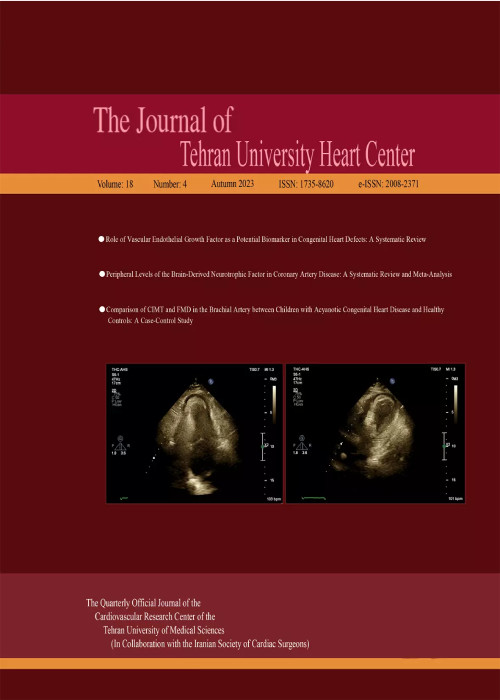Risk Factors of Reperfusion Failure following Primary Angioplasty for ST-Segment Elevation Myocardial Infarction (STEMI)
Author(s):
Abstract:
Background
Although percutaneous coronary intervention (PCI) improves outcomes compared to thrombolysis, a substantial number of ST-elevation myocardial infarction (STEMI) patients do not achieve optimal myocardial reperfusion. This study was designed to evaluate factors related to suboptimal myocardial reperfusion after primary PCI in patients with STEMI.Methods
Totally, 155 patients (124 men; mean age = 56.6 ± 11.03 years, range = 31- 85 years) with STEMI undergoing primary PCI were retrospectively studied. Additionally, the relationships between the occurrence of reperfusion failure and variables such as age, sex, cardiac risk factors, family history, Body Mass Index, time of symptom onset, ejection fraction, previous PCI, coronary artery bypass graft surgery or previous myocardial infarction, and angiographic data were analyzed. Results
Procedural success was 97.1% and complete ST resolution occurred in 43.2%. Age; cardiac risk factors; family history; body mass index; previous MI, coronary artery bypass graft surgery, or PCI; and use of thrombectomy device and GPIIb/IIIa inhibitor were not the determining factors (p value > 0.05). According to our multivariate analysis, time of symptom onset (OR [95% CI]: 045 [0.2 to 0.98]; p value = 0.044) and ejection fraction (OR [95% CI]:0.37 [0.26 to. 091]; p value = 0.050) had reverse and male gender had direct significant associations with failed reperfusion (OR [95% CI]: 0.34 [0.11 to 1.08]; p value = 0.068). More degrees of ST resolution occurred when the right coronary artery was the culprit vessel (p value = 0.001). The presence of more than three cardiac risk factors was associated with failed reperfusion (p value = 0.050).Conclusion
Considering the initial risk profile of patients with acute STEMI, including time of symptom onset and ejection fraction, as well as the accumulation of cardiac risk factors in a given patient, we could predict failed myocardial reperfusion to design a more aggressive therapeutic strategy.Language:
English
Published:
The Journal of Tehran University Heart Center, Volume:8 Issue: 3, Jul 2013
Pages:
146 to 151
magiran.com/p1187102
دانلود و مطالعه متن این مقاله با یکی از روشهای زیر امکان پذیر است:
اشتراک شخصی
با عضویت و پرداخت آنلاین حق اشتراک یکساله به مبلغ 1,390,000ريال میتوانید 70 عنوان مطلب دانلود کنید!
اشتراک سازمانی
به کتابخانه دانشگاه یا محل کار خود پیشنهاد کنید تا اشتراک سازمانی این پایگاه را برای دسترسی نامحدود همه کاربران به متن مطالب تهیه نمایند!
توجه!
- حق عضویت دریافتی صرف حمایت از نشریات عضو و نگهداری، تکمیل و توسعه مگیران میشود.
- پرداخت حق اشتراک و دانلود مقالات اجازه بازنشر آن در سایر رسانههای چاپی و دیجیتال را به کاربر نمیدهد.
In order to view content subscription is required
Personal subscription
Subscribe magiran.com for 70 € euros via PayPal and download 70 articles during a year.
Organization subscription
Please contact us to subscribe your university or library for unlimited access!


